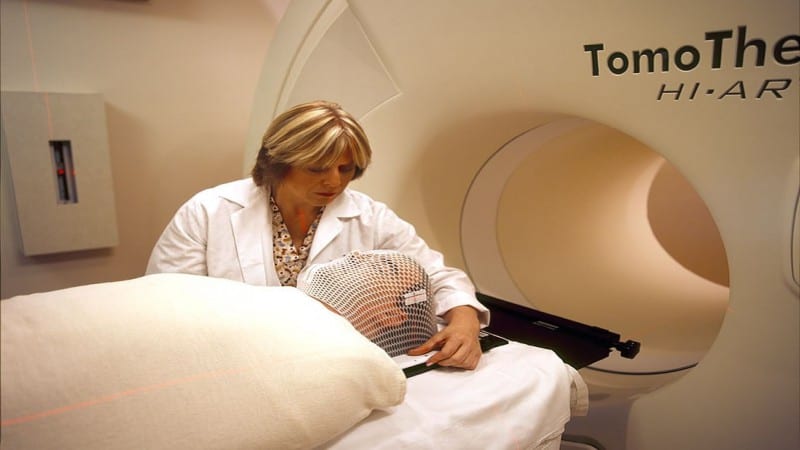Radiotherapy is usually given to supplement the surgical procedure and to reduce the risk of local spread. In some cancers, radiotherapy without surgery may suffice.
Radiation therapy utilizes radioactive radiation that destroys cancer cells and shrinks the tumors by exposing cancer cells to radiation damage. Even healthy tissue is destroyed, but with modern technology healthy tissue can be better saved. Cancer cells tend to divide faster than healthy cells, so they are particularly susceptible to radiation therapy.
About half of the cancer patients receive radiotherapy at some stage of their care. The radiation is usually applied directly to the tumor or metastases. In the treatment of widespread cancer, radiation treatment can sometimes be given, for example, to the entire upper body. Radiation therapy can be provided with a special external radiation source or internally by introducing the radiation source in one way or another into the body. One example of the last mentioned is isotope treatment where the radioactive drug acts directly on the tumor and only causes very little damage to the healthy tissue.
If the cancer is local, the choice between surgery and radiotherapy depends on the effectiveness of the treatment and the damage caused by the treatments. The importance of radiation therapy in cancer has increased, especially with the development of the preservative treatments.
Radiation therapy can be given either before or after surgery. For example, if the surgeon does not completely remove the tumor or the risk of recurrence of the tumor is high, the treatment is usually supplemented with radiotherapy after surgery. Prior to surgery, the tumor may be pre-reduced by radiotherapy.
A combination of radiation therapy and chemotherapy sometimes becomes relevant. These treatments reinforce each other and provide more effective care. The so-called chemo-radiation therapy has yielded better results in the treatment of many types of cancer, such as certain types of lung cancer, and cancer of the head and neck. However, when using cytostatic agents, the negative effects of radiation therapy increase.
Radiotherapy is completely painless and targets the tumor or metastases directly. Radiation therapy is often given periodically, eg for 2-8 weeks. The radiation is usually given daily in the form of small single doses mostly during weekdays. The treatment takes a few minutes at a time. The distribution of radiation therapy in several smaller doses reduces the adverse effects on the healthy tissues and the efficacy of radiotherapy is improved for the tumor. Most people can live a fairly normal life during treatment. Instead of this periodic (intermittent) radiation treatment, there is in some cases a so-called accelerated (faster) radiation therapy.
Advances in technology and medicine have meant that radiation therapy can be more accurately targeted to the tumor while reducing the damage to healthy tissue. Radiation therapy is usually a fairly well-tolerated cancer treatment. However, the treatments still cause side effects.
Radiation therapy not only affects cancer cells but also normal cells. The effects on the healthy tissue largely depend on the radiation dose used, the length of the treatment time and the part of the body that receives the radiation. Side effects occur only in the area of the body that is irradiated.
Side effects of radiation therapy may occur during treatment immediately after treatment or much later, sometimes even after several years. Immediate side effects of radiation treatment are detected in rapidly dividing tissue such as skin, mucous membranes and bone marrow. Most side effects can now be effectively prevented and treated.
![]()



